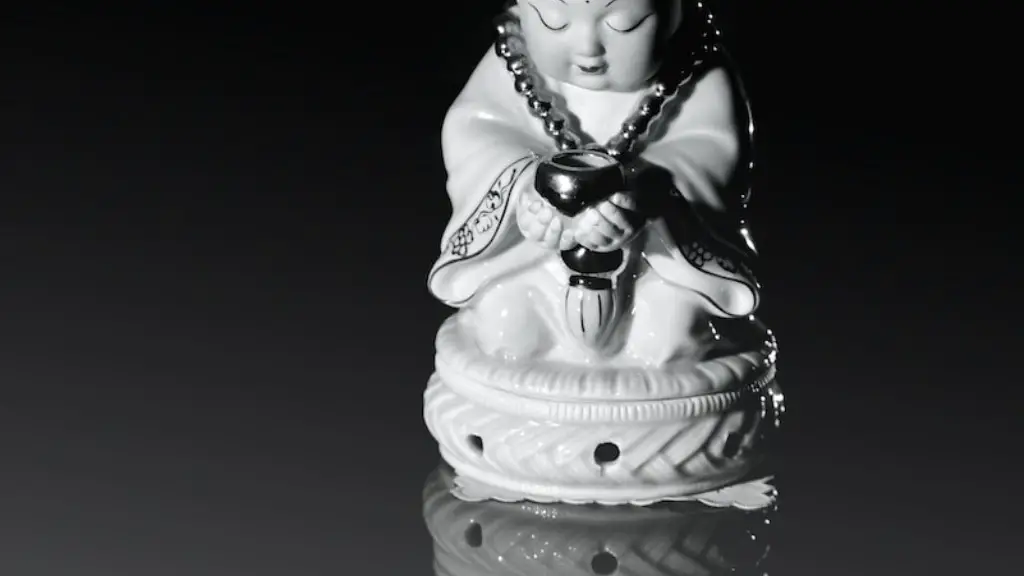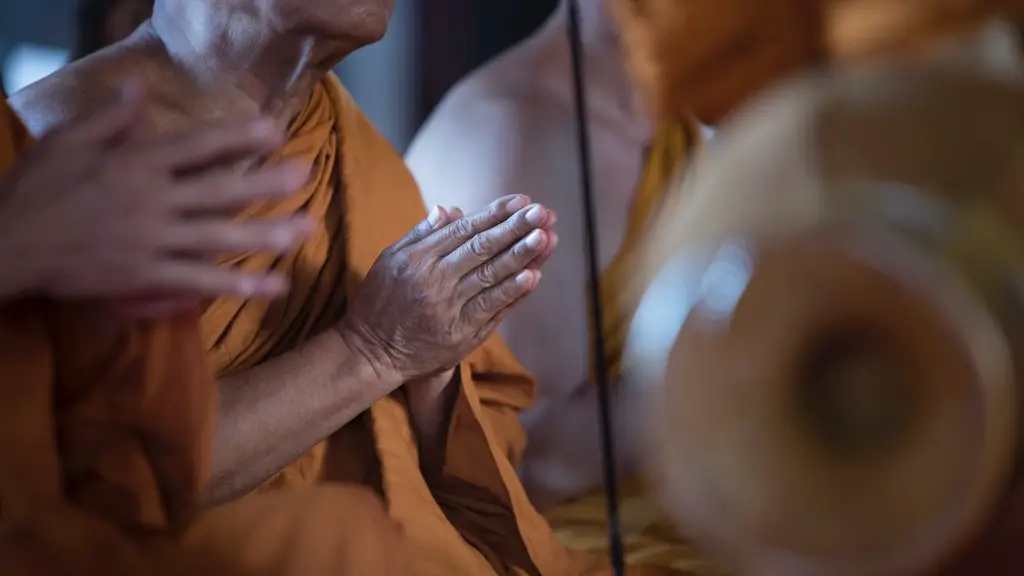Buddhism originally preached that people are capable of attaining Nirvana, or a state of perfect peace and bliss, through their own actions and effort. The teachings of Buddhism emphasize the Four Noble Truths, which state that life is characterized by suffering, that suffering has a cause, that suffering can be ended, and that there is a path leading to the end of suffering.
Buddhism preaches the Four Noble Truths, which are the truth of suffering, the truth of the origin of suffering, the truth of the cessation of suffering, and the truth of the path to the cessation of suffering.
What are the 3 main beliefs of Buddhism?
Buddhism is a religion that is based on the teachings of Siddhartha Gautama. The main principles of this belief system are karma, rebirth, and impermanence.
Karma is the belief that our actions have consequences, both good and bad. What we do in this life will affect our future lives.
Rebirth is the belief that we are reborn into different forms after we die. We may be reborn as a different person, animal, or even plant.
Impermanence is the belief that nothing in life is permanent. Everything is constantly changing and will eventually come to an end.
The Five Precepts are basic guidelines for living a moral and ethical life. They are: refrain from taking life, refrain from taking what is not given, refrain from the misuse of the senses, refrain from wrong speech, and refrain from intoxicants that cloud the mind.
What is the main purpose of Buddhism
Nirvana is the goal of Buddhism and is believed to be attainable only with the elimination of all greed, hatred, and ignorance within a person. Nirvana signifies the end of the cycle of death and rebirth.
There are a few key differences between Buddhism and Christianity that are worth noting. For one, Christianity is monotheistic and relies heavily on the idea of a God who created the world and everything in it. On the other hand, Buddhism generally takes a more non-theistic approach and does not believe in a creator God. Additionally, Christianity typically emphasizes the importance of living a good and moral life in order to please God, while Buddhism tends to focus more on internal enlightenment and personal growth.
Is Buddhism a faith or religion?
Buddhism is a religion that was founded by Siddhartha Gautama, also known as the Buddha, more than 2,500 years ago in India. With approximately 470 million followers, Buddhism is considered one of the major world religions by scholars. The core beliefs of Buddhism include the Four Noble Truths, which state that suffering is a part of life, and that the cause of suffering is desire. Buddhists also believe in karma, or the law of cause and effect, which states that a person’s actions have consequences in this life and in future lives. Buddhists strive to end suffering by following the Eightfold Path, which includes ethical principles and meditation.
Buddhists believe that people should try to end suffering; all things should be seen as having no self or essential nature. The main Buddhist values are love, wisdom, goodness, calmness and self-control. Buddhists also believe in karma, which is the idea that a person’s actions in this life will affect their future lives.
Do Buddhist believe in God?
Buddhism is a tradition focused on spiritual liberation, it is not a theistic religion. The Buddha himself rejected the idea of a creator god, and Buddhist philosophers have even argued that belief in an eternal god is nothing but a distraction for humans seeking enlightenment.
The kleshas are the afflictive emotions that cause suffering and are the root of rebirth. The cessation of the kleshas and the attainment of nirvana (nibbāna), with which the cycle of rebirth ends, has been the primary and the soteriological goal of the Buddhist path for monastic life since the time of the Buddha.
Nirvana is the ultimate goal of the Buddhist path and is the complete cessation of suffering and the cycle of rebirth. The attainment of nirvana marks the end of the kleshas and the attainment of true liberation.
What is the main moral code of Buddhism
The Five Precepts are basic guidelines for living a moral and ethical life according to the Buddha. By following these precepts, we can avoid causing harm to others and ourselves, and live in a way that is more in line with our true nature.
1. Harming living beings: This precept advises us to avoid causing harm to any living being, including animals, plants, and other people. We should also be careful not to harm ourselves through our actions or words.
2. Taking things not freely given: This precept advisees us to avoid taking anything that does not belong to us, including things that have been stolen or borrowed without permission. We should also be respectful of other people’s property and not damage or destroy it.
3. Sexual misconduct: This precept advises us to avoid any sexual activity that could cause harm to ourselves or others, including adultery, rape, and sexual harassment. It is also important to respect other people’s sexual boundaries and not pressure them into any activity they are not comfortable with.
4. False speech: This precept advises us to avoid speaking falsehoods or engaging in slander or gossip. We should also be mindful of the impact our words have on others and not use them to hurt or mislead.
The main tenants of Buddhism are the Four Noble Truths and the Eightfold Path. These precepts urge followers to live moral lives, be mindful of their thoughts and actions, and strive for personal transformation. Buddhists do not believe in any kind of deity or god, although there are supernatural figures who can help or hinder people on the path towards enlightenment.
Do Buddhists believe in heaven?
There is no concept of punishment or reward in Buddhism. There is no divine being who decides who goes to hell or heaven. There is merely the illusory results of our thoughts, words and deeds, which we call karma.
The two belief systems are incompatible according to Stephen Lahey. Christians preach of one God, creation and salvation, while Buddhists believe in reincarnation, enlightenment and nirvana. Lahey, an Episcopalian minister and religious studies professor at the University of Nebraska-Lincoln said, “The beliefs aren’t compatible at all.”
What is the Buddhist way of life
The ‘Middle Way’ is the Buddhist way of life; a self-development progression through the Noble Eight-fold Path which comprises Right Understanding, Right Thought, Right Speech, Right Action, Right Livelihood, Right Effort, Right Mindfulness and Right Concentration. The Middle Way is often considered to be the path between the extremes of self-indulgence and self-mortification.
Death is not the end of life according to Buddhist teachings. After death, the spirit continues and may be reborn. Death can be an opportunity for liberation from the cycle of life, death and rebirth.
Does Buddhism have a holy book?
Tripitakas are the three canonical collections of Buddhist scriptures and are considered as the holy books of Buddhism. The Tripitakas consist of the Vinaya Pitaka, the Sutta Pitaka, and the Abhidhamma Pitaka. The Vinaya Pitaka contains the rules and regulations for the monks and nuns, while the Sutta Pitaka contains the actual discourses of the Buddha. The Abhidhamma Pitaka, on the other hand, contains the Buddha’s philosophical teachings.
An important value in Buddhist ethics is non-harming or non-violence (ahimsa) to all living creatures from the lowest insect to humans which is associated with the first precept of not killing. This value is important because it emphasize the importance of all life, no matter how small or insignificant it may seem. Insects are often seen as pests that need to be eliminated, but if we killing them we are also causing suffering. This principle can be applied to all beings, including animals that are often seen as food. Rather than causing them suffering, we can choose to live in a way that respects their lives.
How do Buddhists worship
Buddhists worship at temples or monasteries as a way to meditate and pray. Some also set up shrines in their homes as a way to worship privately. When offering respect to the Buddha at a shrine, Buddhists often use fresh flowers, lights, and lamps. Burning incense is also common as it is believed to make merit for the devotee.
Buddhist teachings state that there are divine beings called devas (sometimes translated as ‘gods’) and other Buddhist deities, heavens, and rebirths in its doctrine of saṃsāra, or cyclical rebirth. While these beings are not worshipped in the same way as traditional gods, they are still revered and respected by Buddhists. In addition to the devas, there are also various hells and heavenly realms that a person may be reborn into depending on their karma.
Warp Up
Buddhism preaches the Four Noble Truths, which are that life is suffering, that suffering is caused by attachment and desire, that suffering can be ended by letting go of attachment and desire, and that the path to freedom from suffering is the Eightfold Path.
Buddhism preaches that the way to achieve enlightenment is through Moral Conduct, Meditation, and Wisdom.




